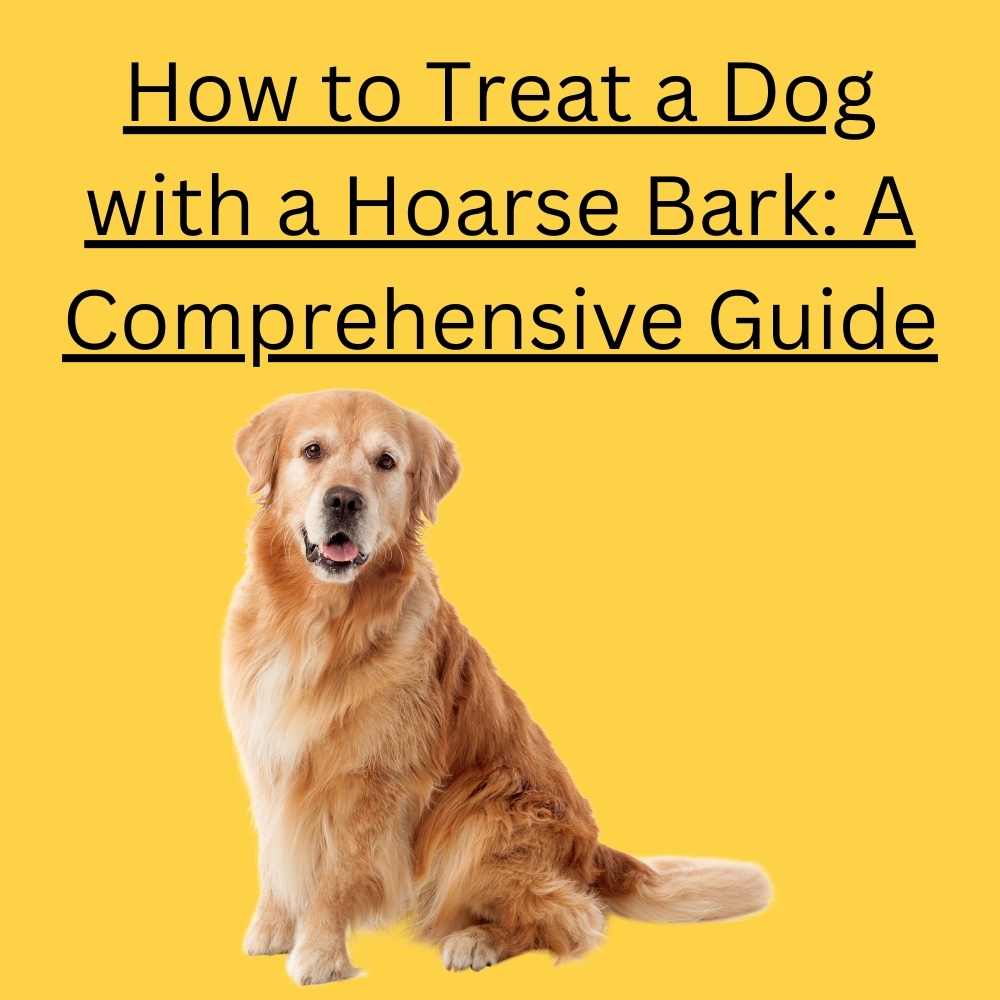How to Treat a Dog with a Hoarse Bark: A Comprehensive Guide
A hoarse bark in dogs can be worrying for pet owners. This article aims to provide insights into the causes, treatments, and prevention methods for canine laryngitis, a common reason behind hoarse barking.
Causes of Hoarse Barking
There are several potential causes for a dog’s hoarse bark, including:
- Cold or flu: Just like humans, dogs can also catch viral infections that affect their vocal cords and cause hoarseness.
- Allergies: Allergic reactions to food, medication, or environmental factors can lead to inflammation in the throat and larynx, resulting in a hoarse bark.
- Strained vocal cords: Dogs who excessively bark or strain their vocal cords can develop laryngitis and lose their voice.
- Kennel cough: This contagious respiratory infection is caused by both bacteria and viruses, and it can result in a harsh, honking cough that may make a dog’s bark hoarse.
- Throat injury or trauma: Any physical injury to the throat can damage a dog’s vocal cords and cause hoarseness.
- Underlying medical conditions: Certain health issues, such as hypothyroidism, heart disease, or cancer can also affect a dog’s bark.
What Produces a Hoarse Bark in Dogs?
Several factors can lead to a hoarse bark in dogs. Infections, whether bacterial or viral, are a common cause. Dogs can contract these diseases through contact with infected dogs or contaminated materials, resulting in laryngitis. Environmental irritants such as pollution, cigarette smoke, and dust can also cause this condition.
Excessive barking can physically damage the larynx, leading to trauma-induced laryngitis. Allergic reactions to certain foods, medications, or environmental factors can cause inflammation of the dog’s larynx. Moreover, underlying medical conditions like Cushing’s disease or hypothyroidism can increase a dog’s risk of developing laryngitis.
How to Treat a Dog with a Hoarse Bark?
How to Treat a Dog with a Hoarse Bark
Treating a dog with a hoarse bark involves several steps. Reduced activity and rest can help the dog recover. Medications can alleviate symptoms and treat underlying causes. Humidification can soothe the irritated larynx, while dietary changes can reduce the likelihood of allergic reactions. In severe cases, surgery might be necessary.
For bacterial infections, antibiotics are prescribed, while antifungal medications treat fungal ones. Nonsteroidal anti-inflammatory drugs (NSAIDs) can reduce inflammation and pain. Steroids may be necessary in specific cases to decrease swelling of the larynx.
Tips for Preventing Hoarse Barking
Prevention is always better than cure when it comes to hoarse barking in dogs. Here are some helpful tips to keep your dog’s voice smooth and healthy:
- Limit excessive barking: Dogs who bark excessively are prone to hoarse barks. Train them to respond to commands instead of constantly barking.
- Avoid irritants: Keep your dog away from smoke, dust, and other environmental irritants that can cause inflammation in the throat.
- Keep vaccinations up to date: Vaccinations can protect your dog from infectious diseases that may result in laryngitis and hoarse barking.
- Maintain proper nutrition: A balanced diet with necessary nutrients is essential for a dog’s overall health, including vocal cord health.
- Regular check-ups: Schedule regular visits with your veterinarian to ensure your dog’s health and address any potential issues early on.
The Most Effective Method to Forestall Laryngitis in Canines
Preventing laryngitis involves avoiding exposure to irritants, managing your dog’s barking habits, ensuring a healthy lifestyle, addressing underlying medical issues appropriately, and obtaining regular veterinary care. With proper care and prevention, you can keep your dog’s voice healthy and prevent hoarse barking. In case of any concerns or persistent hoarseness, it is always best to consult with a veterinarian for proper diagnosis and treatment. Remember that a hoarse bark can be an indication of underlying health problems, so early detection is crucial for your furry friend’s well-being.
Why Does a Dog’s Bark Change?
A dog’s bark can change due to laryngitis, laryngeal paralysis, or laryngeal loss of motion. These conditions disrupt the normal functioning of the larynx, which is crucial for producing sound. In laryngitis, the vocal cords become inflamed and swollen, resulting in a hoarse bark. Laryngeal paralysis occurs when the muscles that control the movement of the vocal cords are damaged, causing a change in voice. Lastly, laryngeal loss of motion can be caused by trauma or nerve damage, affecting a dog’s ability to produce its usual bark. It is essential to address any changes in a dog’s bark promptly, as it can be a sign of an underlying health issue that requires treatment.
Home Remedy for Dog Losing Voice
While the context provided does not specify any home remedies, it’s always advisable to consult a vet before trying any treatment at home.
How to Treat a Dog with a Hoarse Bark Home Remedy
Again, no specific home remedies are mentioned in the context provided. However, rest and hydration can help in general. Always consult with a vet first. In addition, keeping your dog in a calm and stress-free environment can aid in the healing process. Certain herbs such as licorice root and marshmallow root have soothing properties that may help alleviate hoarseness in dogs. However, it’s essential to consult with a veterinarian before using any home remedies for treating a dog with a hoarse bark.
Senior Dog Bark Sounds Hoarse
The context provided doesn’t give specific information about senior dogs. However, hoarseness in older dogs could be due to age-related changes or underlying health conditions.
Dog Hoarse Bark After Boarding
The context provided doesn’t give specific information about hoarse barks after boarding. However, stress or exposure to loud environments might cause this.
My Dog is Losing His Bark
If your dog is losing its bark, it could be due to conditions like laryngitis or laryngeal paralysis. Consult a vet promptly if you notice this symptom. As a preventative measure, ensure your dog leads a healthy lifestyle and receives regular veterinary care. Remember, early detection can help address any underlying health issues before they become severe. So take good care of your furry friend’s vocal cords and keep them barking happily! So, if you notice any changes in your dog’s bark or persistent hoarseness, consult with a veterinarian for proper diagnosis and treatment. Remember, a dog’s bark is its primary form of communication, so it’s essential to keep it healthy and strong. If you notice any changes in your dog’s barking habits or voice, it’s always best to consult with a vet for proper evaluation and treatment. Keep your furry friend happy and healthy by taking care of their vocal cords and overall well-being. Prevention and proper veterinary care are key to ensuring your dog’s bark stays strong and clear. Hoarse barking in dogs can be a sign of underlying health issues, so never ignore it and always seek professional advice from a veterinarian. With proper care and treatment, you can help your dog recover quickly and prevent further hoarseness. Remember, a happy and healthy dog means a happy and healthy owner! So, take good care of your furry friend’s health and well-being, including their vocal cords. Prevention is always better than cure, so make sure to follow the tips mentioned in this article to keep your dog’s bark smooth and strong.
Why Does My Dog Sound Raspy
A raspy sound in your dog’s bark can indicate irritation or inflammation of the larynx. This could be due to infections, allergies, or environmental irritants.
Laryngitis in Dogs Symptoms
Symptoms of laryngitis in dogs include hoarseness or changes in vocalizations, breathing difficulties, inability to drink or eat, lethargy, and fever. If you notice any of these symptoms, consult with a veterinarian for proper diagnosis and treatment.
My Dog Lost His Voice What Can I Do
If your dog loses its voice, seek veterinary care immediately. It could indicate serious conditions that need immediate attention.
In conclusion, a hoarse bark in dogs can be alarming but understanding its causes and knowing how to treat and prevent it can provide peace of mind. Always consult with a vet for any health concerns regarding your pet.
FAQs
Q1: How can I treat my dog’s hoarse bark at home?
Ans1: It is essential to consult with a veterinarian for proper diagnosis and treatment of a hoarse bark.
Q2: What does it mean when a dog’s bark sounds hoarse?
Ans2: A hoarse bark can be an indication of underlying health problems, so early detection is crucial for your furry friend’s well-being.
Q3: How can I treat my dog’s laryngitis at home?
Ans3: Certain home remedies such as rest and hydration, along with a calm environment and soothing herbs like licorice root and marshmallow root, may help relieve hoarseness in dogs, but it’s essential to consult with a vet first.
Q4: Does barking hurt a dog’s throat?
Ans4: Yes, excessive barking can cause irritation and inflammation of the larynx, leading to discomfort and potential damage to a dog’s throat. It’s important to monitor and limit your dog’s barking to prevent any harm.




